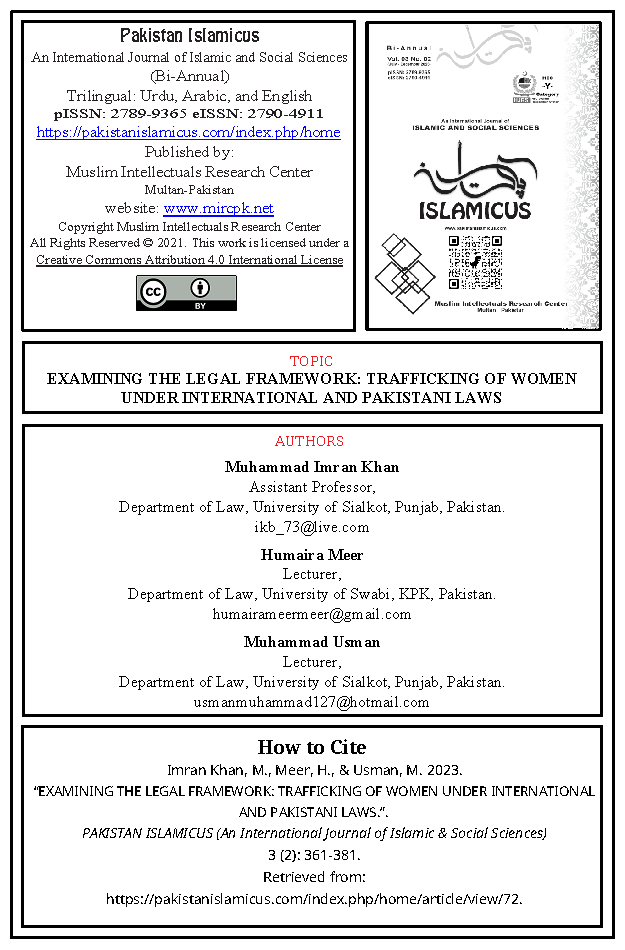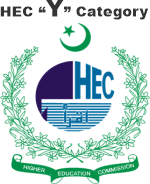EXAMINING THE LEGAL FRAMEWORK: TRAFFICKING OF WOMEN UNDER INTERNATIONAL AND PAKISTANI LAWS
Keywords:
Domestic Law, International Law, Legal Framework, Pakistan, Trafficking of WomenAbstract
This research article assesses the legal landscape governing the trafficking of women under both international and Pakistani laws. It explores the alignment of Pakistan's domestic legal framework with international standards and obligations, shedding light on the strengths and weaknesses of the country's anti-trafficking measures. Through legal analysis, case studies, and empirical data, the study identifies gaps in the legal framework, challenges in enforcement, and gender-specific vulnerabilities faced by trafficked women. It emphasises the need for international cooperation to combat transnational human trafficking networks effectively. The research offers insights and recommendations for policymakers, legislators, and civil society to strengthen Pakistan's commitment to combating human trafficking and protecting the rights of trafficked women.
References
Allain, J. (2014). No effective trafficking definition exists: Domestic implementation of the Palermo Protocol. Alb. Gov't L. Rev., 7, 111.
Chuang, J. (1998). Redirecting the debate over trafficking in women: Definitions, paradigms, and contexts. Harv. Hum. Rts. J., 11, 65.
Code, P. P. (1860). Chapter XVI. Of kidnapping, abduction, slavery, and forced labour,” Sections, 359-374.
Farrior, S. (1997). The international law on trafficking in women and children for prostitution: Making it live up to its potential. Harv. Hum. Rts. J., 10, 213.
Hussain, N., Khan, A., & Chandio, L. A. (2023). Legal Safeguards against Mob Justice: An Analysis of Blasphemy Laws in Pakistan and International Human Rights Norms. Al-Qamar, 13-26.
Kelly, E. (2002). Journeys of jeopardy: A review of research on trafficking in women and children in Europe. United Nations.
Kelly, L., Regan, L., & Willis, C. F. (2000). Stopping Traffic: Exploring the extent of, and responses to, trafficking in women for sexual exploitation in the UK (Vol. 36). London: Home Office, Policing and Reducing Crime Unit.
Khan, A. S., Bibi, A., Khan, A., & Ahmad, I. (2023). Responsibility of Sexual Violence Under International Law. Journal of Social Sciences Review, 3(1), 29-41.
Khan, A., Bhatti, S. H., & Jillani, M. A. H. S. (2021). An overview on individual criminal liability for crime of aggression. Liberal Arts & Social Sciences International Journal (LASSIJ).
Khan, A., Hussain, N., & Oad, S. (2023). The Rome Statute: A Critical Review Of The Role Of The Swgca In Defining The Crime Of Aggression. Pakistan Journal of International Affairs, 6(1).
Khan, A., Iqbal, N., & Ahmad, I. (2022). Human Trafficking in Pakistan: A Qualitative Analysis. Journal of Social Sciences Review, 2(3), 257-268.
Khan, A., Javed, K., Khan, A. S., & Rizwi, A. (2022). Aggression and individual criminal responsibility in the perspective of Islamic law. Competitive Social Science Research Journal, 3(1), 35-48.
Miko, F. T. (2004). Trafficking in women and children: the US and international response-updated March 26, 2004.
Miko, F. T. (2004). Trafficking in women and children: the US and international response-updated March 26, 2004.
Musharraf, G. P., & Mansoor, J. A. (2002). Prevention and Control of Human Trafficking Ordinance. Retrieved July 23, 2009, from Federal Investigation Agency, Government of Pakistan Web site: http://www. fia. gov. pk/pchto2002. htm.
Niaz, U. (2003). Violence against women in South Asian countries. Archives of women’s mental health, 6, 173-184.
Sullivan, B. (2003). Trafficking in women. International Feminist Journal of Politics, 5(1), 67-91.
Tzvetkova, M. (2002). NGO responses to trafficking in women. Gender & Development, 10(1), 60-68.
Weiss, A. M. (2012). Moving forward with the legal empowerment of women in Pakistan. Washington: US Institute of Peace.
Williams, P. (2012). Trafficking in women and children: A market perspective. In Illegal Immigration and Commercial Sex (pp. 145-170). Routledge.

Published
Issue
Section
License
Copyright (c) 2023 PAKISTAN ISLAMICUS (An International Journal of Islamic & Social Sciences)

This work is licensed under a Creative Commons Attribution 4.0 International License.
This work is licensed under a Creative Commons Attribution 4.0 International License.

































